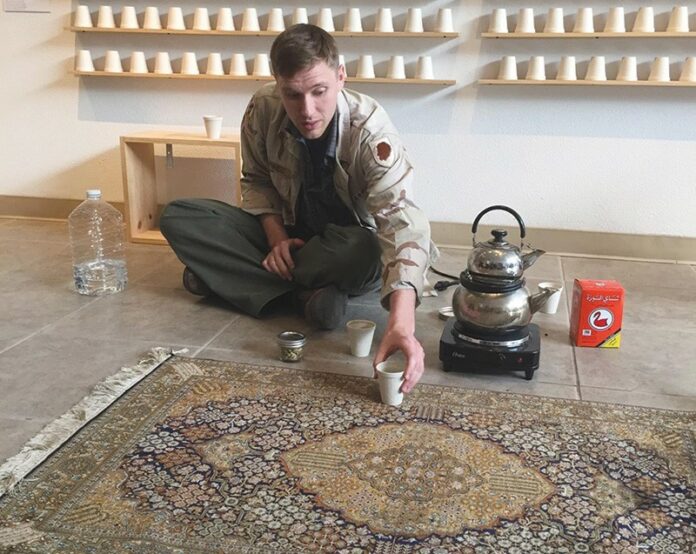Story has always been the beating heart of theater. In Aaron Hughes’ hands, that art has been fused with one of the world’s oldest beverages, resulting in a remarkable theater piece called simply Tea.
“Tea came out of a return trip I took in 2009 to Iraq,” says Hughes, an acclaimed artist, activist and Army veteran. He estimates that he’s presented Tea about 75 times, all around the world. Hughes brings the piece to Sonoma County for a limited run at the Imaginists (www.theimaginists.org) in downtown Santa Rosa. In the piece, Hughes tells his own and others’ stories, and invites the audience, seated in a circle on the floor, to share their own tales.
And, of course, he serves tea.
In 2003–04, Hughes was deployed in Kuwait. His visit five years later—with a delegation of union activists and labor workers in Iraq for in an international labor conference—ended up changing his life.
“When I was there the first time, I never accepted any Iraqi’s invitation to serve me tea,” he recalls. “It was offered to us all many times, and we always refused. I refused because of my military training, but also because of fear I might be poisoned.”
In Iraq, tea is much more than a mere beverage, it’s a kind of unspoken social contract, which Hughes did not learn until he returned to the country as a civilian and took part in a public forum where Iraqis gathered to give feedback.
“I was really intimidated, sitting up on that stage,” he admits. “Everyone was sharing about what they hoped for from a future Iraq, and at one point I stood up and said, ‘I have to tell you, I was here, in your country, five years ago. I probably pointed my weapon at your family. I’m sorry, and though I’m not here for forgiveness, I do take responsibility.’
“After I shared all this,” Hughes continues, “a man stood up in the back of the room and started walking straight toward me. He was speaking loudly in Arabic, and as he got closer to the stage, I was thinking, ‘Oh man, this guy is going to punch me in the face!’ Just as he stepped onto the stage, the translation came though. He was saying, ‘I just want to come up and give this gentleman a hug!’
“He grabbed me and just hugged me. I totally broke down and started crying, right in front of everyone, including the organizers of the event, who sort of rushed me off stage, sat me down in a cafeteria and offered me tea.”
That was the first time he said yes. Today, he invites others to share tea with him, in the genre-crossing performance piece that includes tales of prisoners in Guantanamo Bay carving artwork onto the Styrofoam cups they received each day. Each performance is different.
“Every time I do this piece, I learn as much from the audience as they learn from me.”









